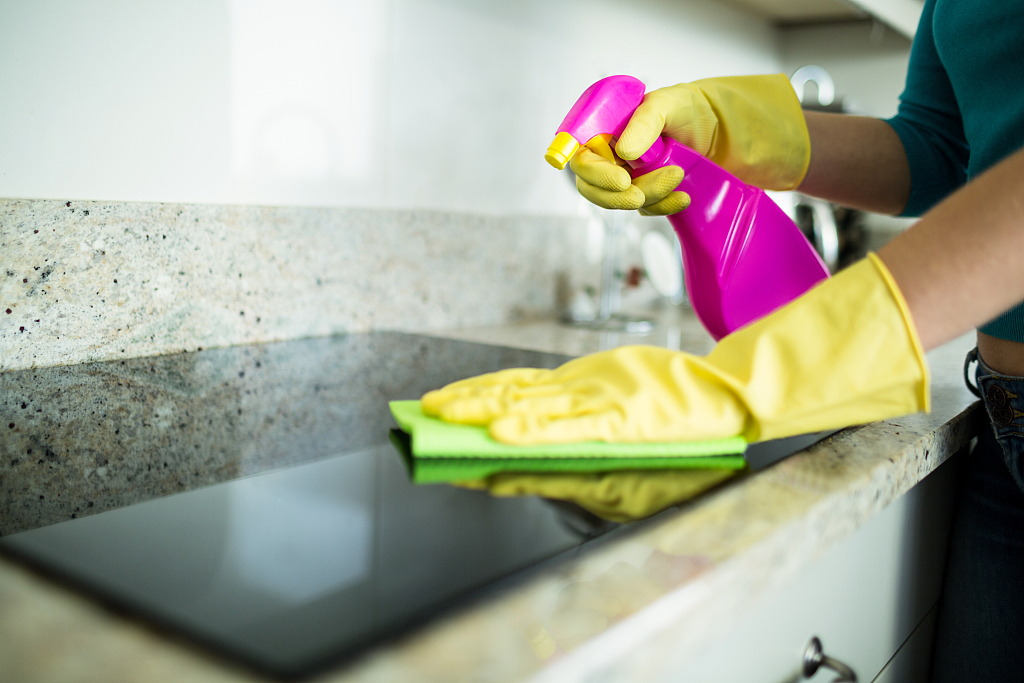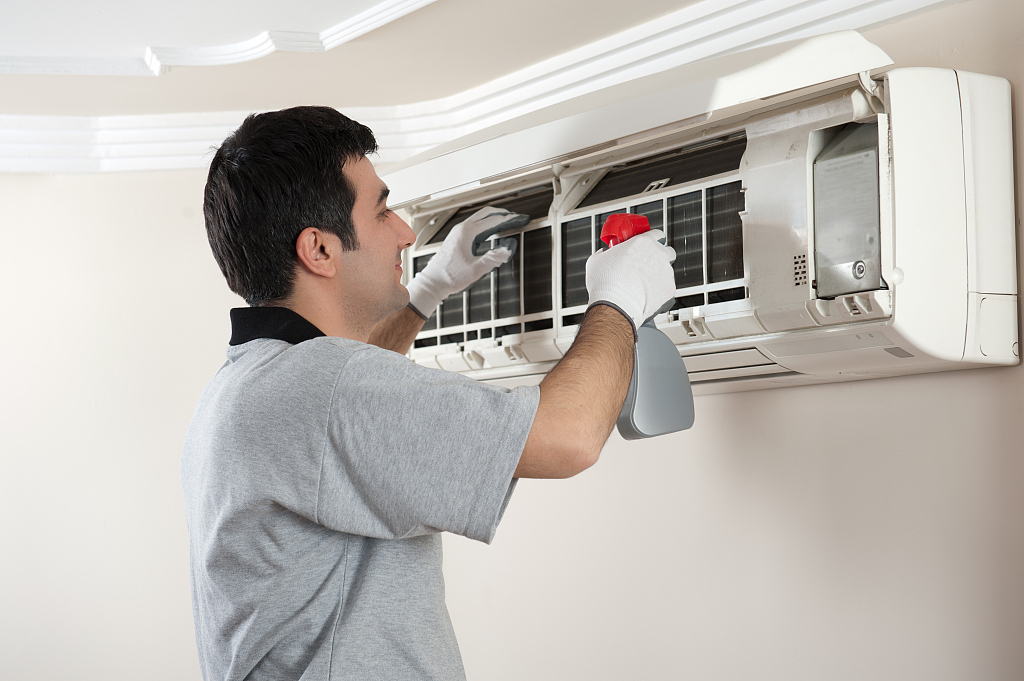Cleaning and disinfection of living environment are necessary during the COVID-19 outbreak. So how do they work?
When do we need disinfection?
For those who stay at home, they only need to clean surfaces of household items on a daily basis and maintain hygiene of household environment, and it's not necessary to carry out disinfection.
But after others (with unknown physical health conditions) visit or after family members' return from an environment with high risk for infection, it's recommended to conduct timely disinfection of surfaces of related household items.
How to disinfect household items?
First, make sure the floor is clean and dry, and there's no damp corner, which is an ideal breeding ground for viruses and bacteria.
Chlorine-containing disinfectant fluid at a concentration of 250 mg/L or products such as 84 disinfectant fluid, bleaching powder, or other chlorine-containing disinfectant powder/tablets and peroxides, can be used to clean floor and general surfaces around the house.
Metals, electrical appliances and other objects not resistant to corrosion (such as cell phone and computer) can be wiped with 75 percent alcohol prep pad or disinfecting wipes, allowing products to remain on it for at least 15 minutes, before wiping off its residue with a clean damp cloth.

Although it remains unclear whether 2019-nCoV can be transmitted through the digestive system, attention should be paid to separate dining in daily life for safety's sake. Mugs and cutleries can be disinfected by boiling water or steam for 15 minutes after washing, or disinfected by disinfection cabinets. Sanitary ware can be wiped with chlorine-containing disinfectant fluid with effective chlorine concentration of 500 mg/L for disinfection, and wiped out with clean water after 30 minutes.
Clothes, bedding and other daily necessities can be cleaned as usual. They can be left to dry outside since it's difficult for 2019-nCov to survive in the air without living cells (like human body). Besides, with outdoor air circulation, viruses wouldn't accumulate on bedding and clothes during the drying process.
Floor and walls of bathroom can be mopped and wiped by chlorine-containing disinfectant fluid at a concentration of 500 mg/L for disinfection. Basin and toilet bowl should be cleaned on a daily basis, with proper amount of disinfectant fluid be sprayed on surfaces for disinfection, and plenty of tap water used for rinsing after disinfection to prevent pipe corrosion.
Mops, rags and other cleaning tools are blind spots for disinfection, which shouldn't be neglected. Soak them in chlorine-containing disinfectant with effective chlorine concentration of 500 mg/L for 30 minutes, and then clean and air dry.
How to prepare disinfectant?
Concentration of disinfectant is of great importance. It is hardly effective if the concentration is not high enough but can cause damage to surfaces of objects and respiratory tract if the concentration is too high. Using alcohol as an example, the optimum concentration is between 75 percent and 85 percent, and there should be ventilation while disinfection to prevent a fire hazard and should not be applied to mucous membrane to avoid irritation.
A commonly used chlorine-containing disinfectant is 84 disinfectant, and disinfectant with chlorine concentration of 500 mg/L can be acquired by adding 10 ml disinfectant into 990 ml of water. If you need to wipe surfaces of objects, it can be further diluted with equal amount of water. In the case of 84 disinfectant tablets, specifications should be read carefully, and disinfectant fluid with chlorine concentration of 500 mg/tablet can be acquired by adding one tablet of 500 mg/tablet or 2 tablets of 250 mg/tablet into one liter of water. It shall be noticed that 84 disinfectant can easily react with other chemicals and generate toxic byproducts, so don't mix it with acidic and alkaline substances (such as vinegar, toilet cleaner and baking soda) or prepare with hot water, and disinfectant purchased shall be stored away from light and heat.
Besides, since disinfectants are normally irritants, please open the window after use for ventilation. Senior citizens, infants and people with respiratory diseases should stay away in other rooms when a room is being disinfected.
Don't forget air disinfection
Respiratory droplet transmission is a major route of transmission, so air disinfection or ventilation is also important.
Natural ventilation is the first choice, so open doors and windows as much as possible for ventilation, which should be conducted two to three times for at least 30 minutes each.
If you need to use air-conditioning, then its filter and filter screen should be cleaned and disinfected on a monthly basis. Disinfectant fluid with chlorine concentration of 250 mg/L can be sprayed on them and left for 30 minutes for it to work.

As for ordinary people, things that should be disinfected most after returning to home are our bodies, clothes and belongings, and the mask should be discarded. There should be a buffer zone at the entrance between the contaminated area (outdoor) and the clean area (home). After getting inside, you can clean your hands with alcohol-based hand sanitizer first, remove your clothes and put them on hangers, then change to indoor slippers, remove mask and dispose it into a sealed rubbish bin, disinfect your hands again, take a shower in bathroom, and change into home wear.
In addition to aforesaid disinfection items, don't forget hand disinfection or hand washing, which is the most economical way to prevent transmission. Thoroughly wash your hands before having dinner, after using the bathroom, after returning home, after coughing or sneezing, and before touching your eyes, mouth and nose.
Higher disinfection requirements on people staying home for self-quarantine
Disinfection methods for people staying at home for self-quarantine are basically the same as that of ordinary people, but the disinfection frequency is obviously higher. Cutleries and objects frequently touched by the quarantined person shall be cleaned and disinfected frequently on a daily basis, such as night tables, bedstead and other bedroom furniture. Surfaces of bathroom and toilet shall be cleaned and disinfected at least once on a daily basis. The buffer zone can be set at the entrance of the room of quarantined people's daily activities.
Use ordinary laundry soap and clean water to wash clothes, bed sheet, bath towel and washcloth in close contact with quarantined people, or use washing machine to wash them with water at 60~90 degrees Celsius and regular household laundry detergent, and then let them fully air-dry.
Family members shall wear masks, disposable gloves and protective clothing (such as plastic apron) before cleaning and disinfection to avoid direct contact with clothes, bedding and discharges of quarantined people, who shall also thoroughly wash and disinfect both hands before wearing and taking off gloves.
How to disinfect after being diagnosed?
After being diagnosed as a COVID-19 patient, a thorough terminal disinfection of the patient's home must be conducted, and people in close contact with him/her should also be quarantined for 14 days. Places that need to be disinfected include floor, rooms, surface of desks, chairs and other furniture, door knobs, patient's cutleries, clothes, bedding and toys, bathroom, etc. Terminal disinfection normally should be carried out by professionals, and local center for disease control and prevention can be contacted for details. No one should enter into the a patient's home before completion of disinfection works.
Stories in this series were contributed from Tencent Medpedia medical team, which were written and reviewed by medical experts from China's top hospitals. It is intended for informational purposes only, not a substitute for professional medical advice, diagnosis or treatment. Never ignore professional medical advice in seeking treatment because of something you have read on our website. If you think you may have a medical emergency, immediately call your doctor, or go to the hospital.
(The story reviewed by Xiao Erhui from Henan Provincial People's Hospital)